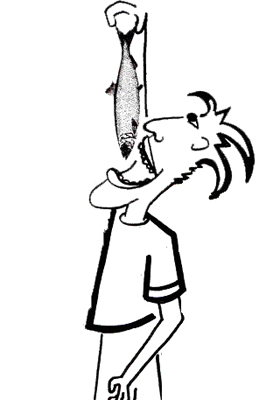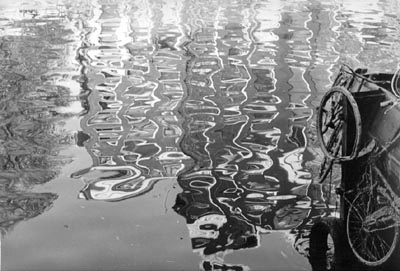Napoleon, the Simpsons and the Dutch
No comments yetAs time marches on, the Dutch will continue to perplex and astonish people throughout the world, although, paradoxically, they will carry on their cultural ideologies of striving to be just average and acting normal because that’s weird enough. People from all parts of the world will continue to envision Holland as this idyllic place full of fairy-tale images, tulips, windmills, cheese, picturesque landscapes and happy-go- lucky inhabitants. People will continue to envision the capital city, Amsterdam, as this insidious place where everyone is high on drugs, engaging in licentious street prostitution and killing their unborn and elderly.
People will also continue viewing the Netherlands as a bastion of liberalism where traditionalism is rejected and where socialistic policies are undermining capitalism and helping to steer the world towards communism. And people will continue to envision the Dutch as these strange people who still walk around in those infamous wooden shoes. The Dutch have been misunderstood since the beginning of their existence; some things just don’t ever change.
In fact, the longest-running primetime animated series in history, The Simpsons, recently perpetuated the wooden shoe stereotype of the Dutch. In a recent episode, Moe the bartender proclaimed to his friends that he was Dutch and then awkwardly walked out of the bar wearing cumbersome, Dutch prototypical wooden shoes. Although somewhat disconcerting to many Dutch, the wooden shoe typecast, along with the many other Dutch stereotypes, isn’t going away anytime soon, especially with preeminent television sitcoms propagating such images on a global scale. Even with such categorizations, the Dutch, as they’ve done for centuries, will continue to focus on just doing their own thing and continue marching to the beat of their own drum, without ever skipping a beat.
De Zilvervloot
People can say what they want about the Dutch with their intriguing ways, controversial policies and inimitable country, but world reports have consistently ranked the Netherlands as possessing one of the best qualities of life in the entire world. In the United Nations Human Development Report of 2004, the Netherlands was ranked fifth in the world and second in the European Union (EU) in terms of health and life expectancy, education and earnings. The report stated that the Netherlands had an average life expectancy of 78.3 years, among the highest in the world. The liberal and socialistic policies of the Dutch and their unique customs and mannerisms certainly don’t seem to be having an adverse effect on their country, as many people from around the world would like to believe.
As in the patriotic song, De Zilvervloot, where the Dutch honor the naval hero Piet Hein by proclaiming your name is small but your deeds are great, the tiny country of the Netherlands has achieved, and continues to achieve, monumental accomplishments. The Dutch astonishingly survived raging waters and reclaimed the majority of their country through the use of ingenuity and cooperation. Because of this monumental feat, the Dutch are fond of stating, “God may have made the earth, but the Dutch made Holland.” They further went on to build one of the mightiest economic empires that the world had ever seen. The Dutch continue to be one of the most industrialized nations in the world and are leaders in the field of social justice. For the modern-day Dutch, as their country is throttling full steam ahead, it’s simply business as usual.
What started out as a small trading association between a handful of countries, The European Union (EU) is now the driving force in European politics and economics. European integration and cooperation is paramount in order for the EU to continue building upon its successes. Many European nations find such cooperation and acceptance of other cultures daunting, but for the small trading nation of Holland, such foreign cooperation and interaction is simply business as usual. The Dutch built their robust economic infrastructure through international commerce, cooperation and acceptance of other cultures. The Dutch are active participants in attempts at further solidifying the European Union and claim to be willing to forfeit some of their national identity and sovereignty in order to assist with this comprehensive objective.
As they recently abandoned their precious guilder with little resistance or remorse, the Dutch are progressively looking forward and cooperating with their neighbors in working towards European integration that, they feel, will enhance the qualities of life for all of its members. Even with such altruistic efforts of sacrificing national sovereignty for the advancement of the EU, the Dutch will, undoubtedly, never forfeit their Dutchness and will continue being so Dutch, as they have throughout their existence. The great transformations occurring in Europe in the context of culture, politics, economics, sociology and even psychology, cannot alter the persevering nature of the Dutch in preserving their deeply ingrained Dutch ideologies and attributes.
A fine line
The Dutch will continue to balance the fine line between capitalism and socialism. As a small trading nation with deeply established mercantile roots, the Dutch strive for profitability; but with egalitarianism also deeply rooted, the Dutch won’t leave even their frailest of citizens isolated or neglected in the fast-paced, money driven world in which they operate. The Dutch will continue relying on pragmatism in dealing with universal problems and will continue to alleviate them with practical, very Dutch-like solutions. The Dutch perceive such problems as seeds of opportunity. As they seize these opportunities, the Dutch will continue to be pioneers in the world with breakthrough, revolutionary solutions, which, undoubtedly, may be just too radical for some cultures to accept. The Dutch have been confronted with intense global scrutiny over many of their revolutionary social policies. The Dutch merely shrug off such scrutiny and like to proclaim, rather superciliously, that “the world will come around to our way of thinking eventually.” With many nations throughout the world following in their footsteps by exploring, and even implementing, similar social policies, the Dutch haughty proclamation holds merit.
With globalization and an ever-shrinking world, the preservation of cultures is becoming an arduous and painful task for many nations around the globe. Many cultures are fighting incessantly the increasing trends of global corporate hegemony, which they feel are leading to social inequality and pervasive consumerism. General Douglas MacArthur dramatically stated in his farewell address to congress after his abrupt dismissal during the Korean conflict, “Old soldiers never die, they just fade away.” As with the old soldiers, many cultures are increasingly fearful that their traditions, customs and values will just fade away as corporate consumerism gains even more momentum and proceeds to obliterate the cherished, age-old cultural attributes that stood the test of time.
Dazzling but odorless flowers
The Dutch, meanwhile, are disinclined to expend needless energy on things they cannot change, but focus mainly on those areas of life where they can make positive impacts. The Dutch have the uncanny ability of succeeding in the principle of doing less and accomplishing more. By accepting people, situations, circumstances and events as they occur, and by focusing in those areas of life that truly matter, the Dutch will continue surprising the world with remarkable achievements and imaginative solutions to the world’s worst problems, in spite of their modest and humble cultural attributes. In the process, their deeply ingrained Dutchness will remain steadfast as it has for thousands of years. Political subjugation, religious oppression, military assaults and global ideological transformations were even unsuccessful at deposing this unwavering institution of Dutchness.
The uniqueness of the Dutch has led to much ambiguity, and even frustration, as people try to figure out these Dutch-like ways and mannerisms. Annoyed with this Dutchness, Napoleon Bonaparte dismissed Holland as “a smoke-room full of obese cheese-mongers and devious bank cashiers.” The foreign oppressors who lived in Holland and keenly observed the intriguing ways of the Dutch, however, saw a deeper, underlying reason for this Dutchness. Frenchman Joseph Garat attempted to explain the inexplicable to Napoleon and members of the French Senate in a memorandum espousing the underlying virtues of the Dutch people, who, at the time, lived under the regime of the Batavian Republic.
“The Batave is much more Dutch than the Englander is English, the Frenchman French or any other people in the world anything. It is not exactly their patriotism which gives the Bataves this quality of eternal fixity of character; but rather their land, their climate, their whole manner of being and living, all of which resemble nothing else that can be seen on the face of the earth…He who has built his dwelling with his own hands will never leave it; the Dutch built Holland and they have the air of forever saying “What we have done is good,”…their dazzling but odorless flowers grown beneath the fogs of Haarlem; the wreaths of smoke from their tobacco delight their senses far more than the most exquisite perfume under the most perfect skies…They believe that if this is taken from them they will simply cease to be Bataves; for them it is not just a matter of losing their name, it would be to lose their very lives.”
Fervent cyclists, overarching conformity
These sentiments certainly lay claim to the proposition that the Dutch are the most unique people in the world. What’s next for the Dutch and for Holland? How will these Gentle Giants in this intriguing land perplex the world in future years? One can only anxiously wait, for the Dutch are in no rush for anything. For the time being, people will continue to visit Holland and continue to observe the peculiar ways of the Dutch and the mystifying makeup of the land.
Whether it’s the leaning buildings, the scantily-clad ladies in windows, the aromas emanating from the numerous hash houses, the nonchalance of the Dutch, the spectacular museums and cultural exhibits, the controversial social policies, the capricious weather, the fervent cyclists, the intriguing canals, the ingenious windmills, the towering heights of the Dutch, the overarching conformity, the resilient individuality, or any of the other oddities that transpire within the Dutch borders, people will continue to be in awe and will often find themselves shaking their heads and muttering to themselves, “Only in Holland, Only the Dutch.”
From the 3rd updated edition
—
About the author
As a military officer and international business consultant, Marc Resch has spent time exploring many cultures around the world. His observations of the Netherlands and his working and social interactions with the Dutch laid the groundwork for this book. Marc is a graduate of the U.S. Military Academy at West Point, continues to work in international business and currently resides in New Jersey.
Marc Resch – Only in Holland, Only the Dutch. An in-depth look into the culture of Holland and its people
Rozenberg Publishers – ISBN 978 90 5170 800 4. 3rd and updated edition. 2010
Visit www.onlyinholland.com for more information about the book and the Netherlands with up to date Dutch news, travel tips, links and much more.
Taking you on a trip through his life in the Netherlands, Marc Resch makes us grateful for his powers of observation and capacity to remember all that assaults your consciousness and sub-consciousness alike. – XPat Review
You May Also Like
Comments
Leave a Reply











